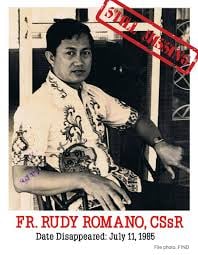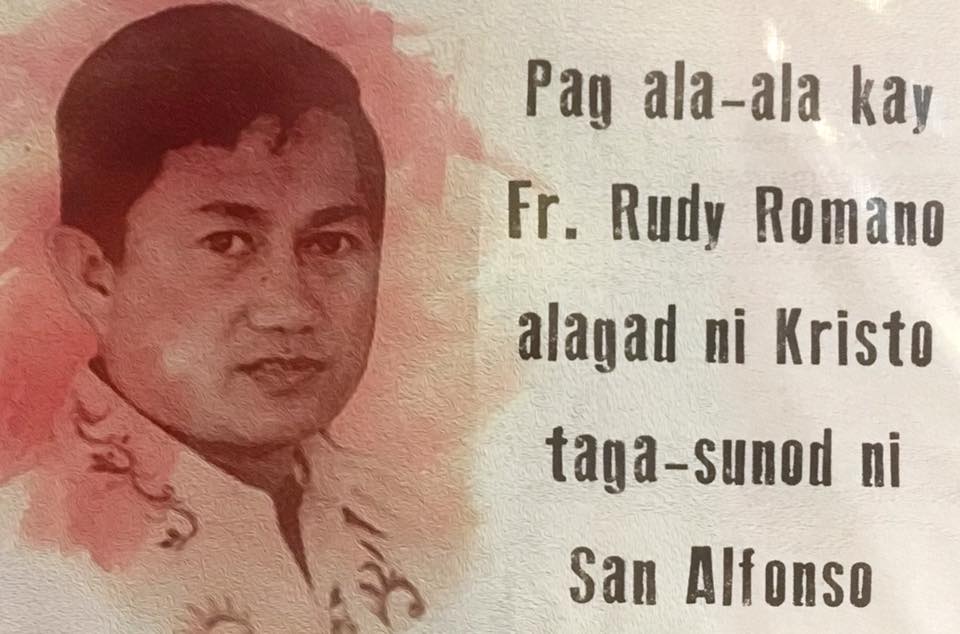Filipino Catholic faithful remember this week the life and works of Redemptorist priest Rudy Romano who was forcibly disappeared in the central Philippine city of Cebu 37 years ago.
“I remember Father Rudy as a preacher of the word of God,” said Bishop Emeritus Emmanuel Cabajar of Pagadian.
The prelate said the missionary priest “dedicated a large part of his pastoral work to the ministry of the Word.”
“He was engaged in the rural missions,” said Bishop Cabajar. “I saw some of his missionary footprints in northern Mindanao, from Iligan to Gingoog.”
Bishop Cabajar said that after “fruitless years of struggle” to find Father Rudy, “a closure had to be made.”
Known as Father Rudy to friends and colleagues, the priest would have been 81 years old this September 26.
He was allegedly disappeared by elements of the Military Intelligence Group during the reign of the late strongman Ferdinand Marcos Sr. who declared martial law in the early 1970s.
“If he were with us today, he would surely have the same, or even stronger commitment to help the hungry farmers, poor workers, homeless urban poor and street children, who bear the brunt of the violent ‘war on drugs’ that is causing innumerable deaths of God’s little ones,” read a statement from the group DaKaTeo said.
DaKaTeo or Damdaming Katoliko sa Teolohiya, known as the Catholic Theological Society of the Philippines, is a professional association of Catholic theologians in the country.
The group said Father Romano’s heart “would have bled to see our present situation, which is worsened by the coronavirus pandemic.”
“Certainly, he would have courageously pursued the same advocacy for the downtrodden,” read the group’s statement.

Almost four decades since his disappearance, the Philippines is “far from the ‘New Heaven and the New Earth’ that Father Rudy dreamt of — a dream that, if fulfilled, he will never have the possibility to cherish,” said the group.
“July 11 comes and goes generally unnoticed. Except for the Redemptorist community and friends and colleagues of Father Rudy, the Catholic Philippines has seemingly forgotten the injustice committed against this man of the cloth who, like the Most Holy Redeemer, gave his life for the ransom of many,” said DaKaTeo.
“Poverty, injustice, human rights violations, absence of genuine peace — these were the very reasons why he linked arms with the wretched of the earth. In so doing, he earned the ire of the powers-that-be and was made to disappear,” it added.
“The desaparecidos are nowhere to be found. Their loved ones continue to wait. Shamefully, the perpetrators roam free. And the scourge continues,” DaKaTeo lamented.
The group maintained that memories of Father Rudy and of many other desaparecidos “should be kept alive.”
“The struggles of truth against lies, of memory against forgetting, of justice against impunity, in whatever concrete ways possible, will eventually lead to the realization of the famous Latin American slogan ‘Nunca más (Never again),’’’ said the group.
In the city of Tacloban, Redemptorist priest Ferderiz Cantiller said he cannot find hope in finding Father Romano under the present administration of President Ferdinand Marcos Jr., son and namesake of the late strongman.
“We don’t expect anything new,” he said. “Old wineskins, old wine,” said the priest who is the youth and vocation director of the Our Mother of Perpetual Help Parish in Tacloban.
Pastor Irma Salvador Mepico of the Promotion of Church People’s Response said that Father Rudy’s disappearance happened during the dictatorship.
“He was abducted by the armed men of Marcos because he was a strong advocate against the dictatorship and a defender of the poor and the oppressed,” said the Protestant pastor.
What happened to the priest “could also happen to anyone,” she said, adding that the current anti-terrorism law in the country “is not running after terrorists but legitimate dissenters, activists, and even priests and pastors.”







